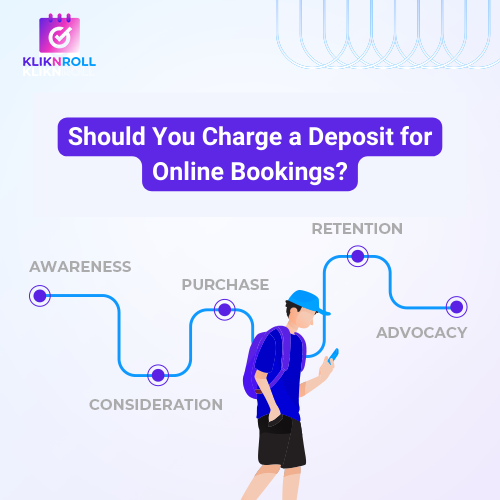Table of Contents
Deposits are a touchy subject for many businesses. What are the benefits? Should you even charge a deposit? In this article, we’ll go through exactly just that.
What is a Booking Deposit in an Online Booking System?
A booking deposit refers to when a customer pays a portion of the total cost upfront to confirm a reservation or appointment with a business. This payment shows the customer’s commitment to the booking and helps the business manage risks by ensuring they incur losses if the customer cancels or doesn’t show up.
Typically, customers pay a deposit when they book online using a booking system. In the past, they’d have to visit the place and pay in cash. The deposit amount varies based on factors like business location, industry, and its standing in the industry.
For instance, restaurants might charge up to $50 for a booking, while businesses like dentists or plastic surgeons might charge anywhere from $100 to $1,000.
Cultural norms also play a role; in places like Hong Kong, it’s common to charge a deposit for various bookings, from restaurant tables to hotel reservations.
The Purpose of Deposits for an Appointment or Booking
In addition to reducing risk, a booking deposit also gives peace of mind to both the customer and the business.
Customers feel confident knowing their reservation is secure, while businesses see it as a sign of the customer’s seriousness and can plan resources accordingly.
Details about booking deposits, like how much is required, refund policies, and payment deadlines, are usually included in booking agreements or terms of service, often found in the online booking system (like Click2Book – our own booking software).
These specifics can vary based on industry norms, business policies, and local laws, underlining the importance of clear communication between businesses and customers.
Benefits of Charging Online Deposits
Reduces & Potentially Eliminates No-Shows
Charging a deposit for appointments or bookings has a significant advantage: it reduces, and sometimes even eliminates, the problem of no-shows.
When customers pay a deposit, it shows they’re serious about keeping the appointment and are willing to invest some money to do so.
The impact on no-shows can also vary depending on the industry. For instance, in places like restaurants or salons, the deposit might be around $50 at most, leaving some room for customers who might change their minds—since $50 isn’t a huge sum, especially for a large group going to a restaurant.
But in industries with higher average booking values, like plastic surgery, deposits can be much higher, often spanning hundreds to thousands of dollars.
A good guideline is to charge a deposit equivalent to 5 to 10% of the expected appointment value, based on our experience. This amount strikes a balance between customer commitment and the risk of losing bookings due to deposit requirements.
Better Resource Allocation
Charging a deposit can also allow your business to have better resource allocation.
For instance, if you run a restaurant, you can purchase ingredients in bulk, or if you own a salon, you can stock up on hair dye supplies in anticipation of more appointments.
It’s also beneficial for managing staff schedules; you can schedule more staff on days with higher expected bookings. With bookings that require deposits, the risk of no-shows or cancellations is significantly lower, giving you the confidence that your resource allocation is on point.
This also allows you to prioritize appointments with deposits, making sure that you can accommodate them even in the event of overbooking, and reschedule other appointments if necessary.
Filtering Serious Inquiries
Some customers may not be fully committed to their appointments. They might be just checking things out or not quite ready to commit to your service.
In some cases, it could even be a competitor trying to spy on your business operations. Requiring a deposit helps weed out these less serious individuals, making sure that every booking contributes to revenue.
This is especially potent if your business’s value per appointment is on the higher end, or maybe you’re arranging a table or event space for many people.
Improved Cash Flow Management
Deposits are also a great tool for businesses to manage their cash flow effectively. They allow you to predict your revenue and expenses over a specific period, giving you foresight and control.
Since deposits reduce the likelihood of last-minute cancellations, you can rely more on your bookings.
Additionally, by integrating deposits with loyalty programs or customer relationship management (CRM), you can better understand your customers’ spending habits and preferences, further helping in cash flow management.
Deposits also serve as a cash flow tool, allowing you to invest upfront while providing flexibility for customers to apply their deposits to their final bill or receive store credits as refunds. This approach strengthens your cash flow management strategy.
Drawbacks of Charging an Online Booking Deposit
Decrease in Conversion Rate & Overall Booking
Adding a deposit requirement to your online booking system might initially lead to a drop in your performance and conversion rate.
This means that fewer people who visit your booking page will end up making a reservation, as some may choose to leave or opt-out.
While you may receive bookings of higher quality and commitment, it could come at the expense of overall volume.
This could translate to fewer bookings overall, which might affect your marketing efforts as you might end up spending more to attract fewer bookings.
However, on the bright side, you may find that the revenue per booking increases, as customers who are serious about their reservations are often more receptive to upselling during the booking process.
Customers Might Prefer Competition Without a Deposit
Another downside of requiring a deposit is how it might affect potential customers who aren’t fully committed yet.
Many businesses choose not to require a deposit as a way to attract more bookings, even though it can result in more no-shows and cancellations.
However, this approach could hurt your business in the long run by limiting the number of customers who give your service a try, which means fewer loyal customers over time.
For businesses that rely on high-value bookings, asking for a deposit can help bring in more serious leads and reduce the risk of losing revenue due to cancellations.
And if you’re running a restaurant or another business with limited capacity, taking deposits can ensure that reservations are honored and resources are managed effectively.
Complications in the Payment or Refund Process
Dealing with deposits for online bookings can sometimes lead to complications, especially when it comes to payments and refunds. While deposits are great for reducing no-shows, getting the payment and refund process right isn’t always easy.
Customers can run into all sorts of issues during payment, from third-party fees to glitches with the payment system. This can lead to frustration and even cause them to abandon their booking altogether, which adds to the reduction of conversion rates.
When it comes to refunds for canceled bookings, things can get even trickier. If there’s any confusion about the refund policy or issues/delays in getting the money back, it can leave customers unhappy and might even damage your business’s reputation.
If there are any issues from the payment gateway of your choosing, they might direct their dissatisfaction to your business.
You should be upfront about deposit terms and payment policies and make sure the process for refunds is smooth and transparent.
It’s a delicate balance, but by putting customer satisfaction first and making sure everything runs smoothly behind the scenes, businesses can keep their customers happy and their finances in check.
So, Should You Charge a Deposit for Online Bookings/Appointments?
Most businesses would benefit from charging a deposit for online bookings, especially for businesses with a higher appointment value – preferably through their online booking platforms.
It can help reduce the risk of cancelations or no-shows while giving a guarantee that customers will honor their appointments, making it easier for businesses to plan and allocate their resources accordingly.
However, there are drawbacks, as mentioned earlier, such as potentially decreasing the conversion rate and customers opting for competitors.
A basic rule of thumb is to charge a deposit for appointments above a certain value. The exact amount depends on your business and industry.
But generally, if the appointment value exceeds the average of all your services combined (excluding skewed niche services), consider charging a deposit.
For businesses like restaurants with reservations for large tables or event spaces where only one group can occupy it at a time, we’d recommend charging a deposit.
However, we advise against new businesses charging a deposit. In the early stages, building momentum is crucial, and asking for a deposit can hinder that.
Moreover, newer businesses often lack the trust and social proof of larger competitors, making customers hesitant to provide their credit card information or even log in to payment platforms.

Hey there! I’m Jeffrey Hau, and my journey in the digital world started after I wrapped up my psychology degree at UCLA. Imagine coming back to the bustling streets of Hong Kong from the tech haven of Silicon Valley – it was a whirlwind of inspiration! Seeing how social media platforms were evolving at breakneck speed and realizing the limitations of traditional advertising in this digital age, I decided to dive in.
In 2012, I laid the foundation of Prizm Group. From our humble beginnings, we’ve now blossomed into a global powerhouse with a team of over 200 passionate professionals. Our HQ is right here in Hong Kong, and we’ve spread our wings to SG, AU, NZ, JP, and China.
As a digital problem solver, our team found that several industries are in need of reservation systems, especially for F&B, Hotels, Beauty, and Medical sectors. Our digital magicians started crafting reservation systems tailored to cater to these specific needs. We extended our expertise to e-commerce, voucher management systems, and campaign management systems, combining them into KlikNRoll – an all-in-one solution. We deep dive into various industries, understanding their unique challenges and developing innovative solutions.
We’re not just a company; we’re your dedicated partners in transforming how you navigate the digital landscape. Our passion lies in providing businesses with intuitive and tailored solutions using KlikNRoll’s powerful capabilities.
Ready to embark on this exciting digital adventure with us? Let’s make your brand stand out in the digital jungle!






